Organisational Behaviour Report: Next Plc, Individual & Team Dynamics
VerifiedAdded on 2023/01/18
|20
|5137
|85
Report
AI Summary
This report provides an in-depth analysis of organisational behaviour, focusing on the context of Next Plc. It begins by examining the influence of organisational culture, power dynamics, and political landscapes on individual and team behaviour. The report then delves into motivation theories, specifically content (Maslow's Hierarchy of Needs) and process (Expectancy Theory), to understand their impact on achieving goals and objectives. Furthermore, it investigates the characteristics of effective versus ineffective teams. Finally, the report applies these theories and concepts to practical business situations within the organisation. The report covers various aspects of organisational behaviour and how they can be applied to improve the performance of an organisation.
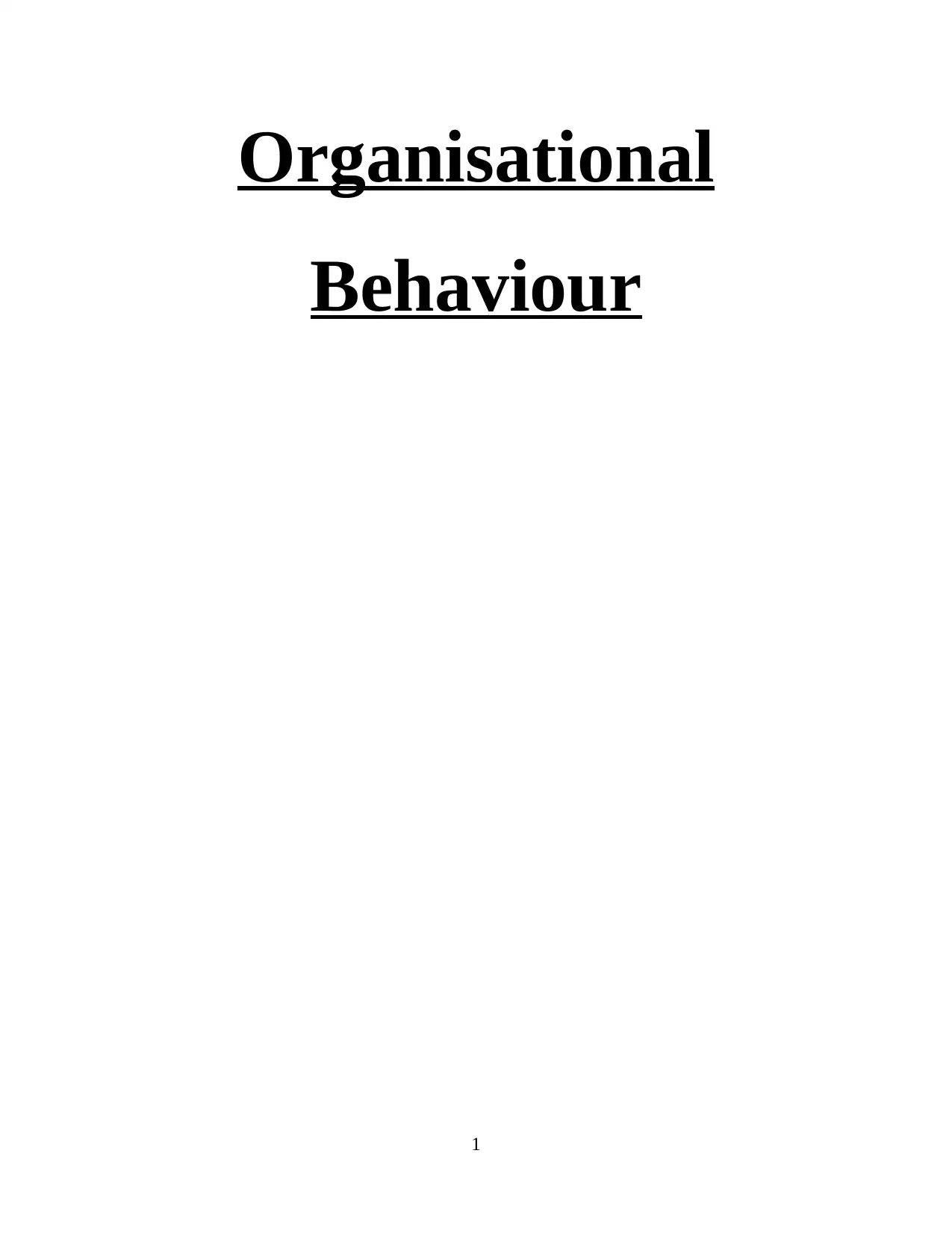
Organisational
Behaviour
1
Behaviour
1
Paraphrase This Document
Need a fresh take? Get an instant paraphrase of this document with our AI Paraphraser
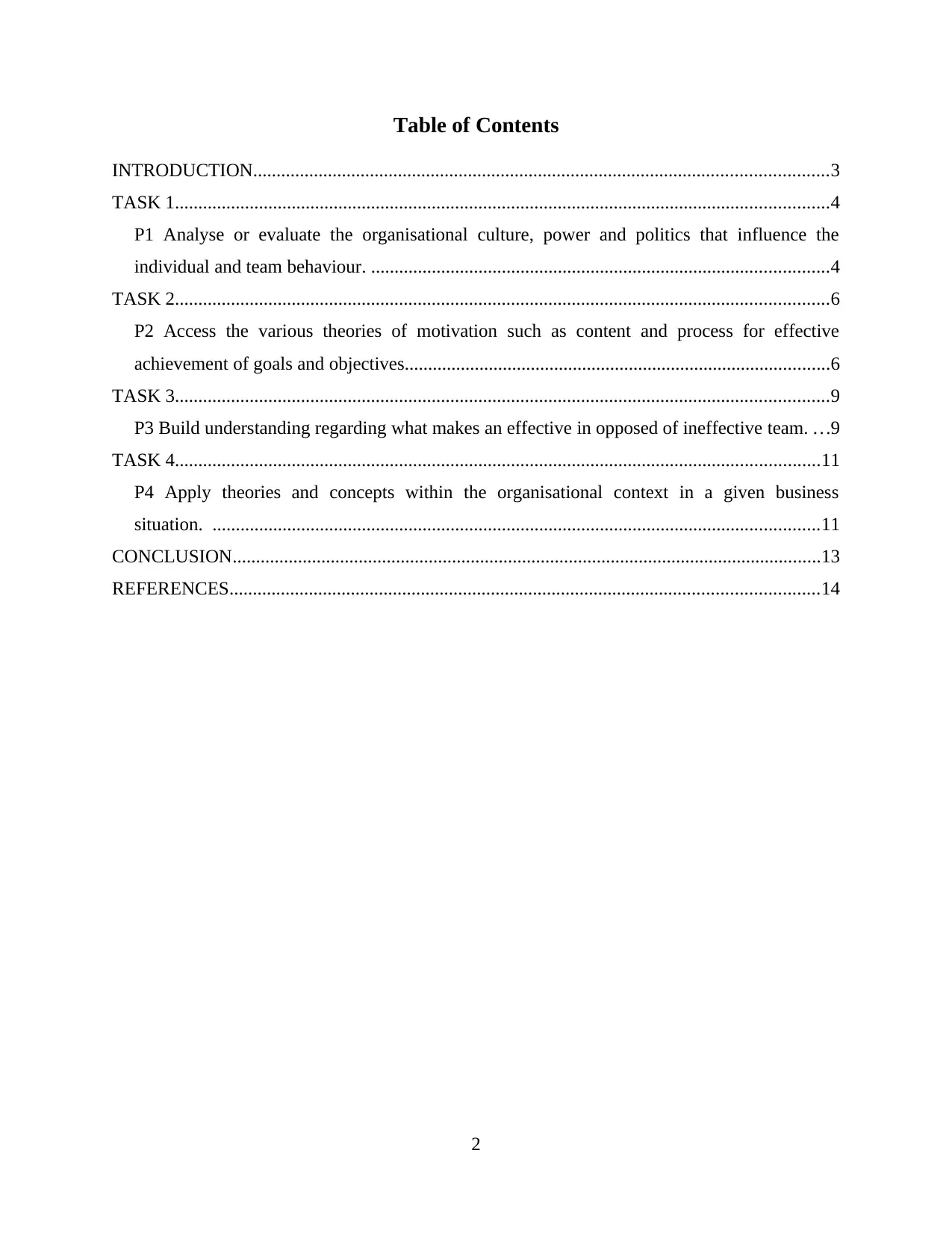
Table of Contents
INTRODUCTION...........................................................................................................................3
TASK 1............................................................................................................................................4
P1 Analyse or evaluate the organisational culture, power and politics that influence the
individual and team behaviour. ..................................................................................................4
TASK 2............................................................................................................................................6
P2 Access the various theories of motivation such as content and process for effective
achievement of goals and objectives...........................................................................................6
TASK 3............................................................................................................................................9
P3 Build understanding regarding what makes an effective in opposed of ineffective team. ...9
TASK 4..........................................................................................................................................11
P4 Apply theories and concepts within the organisational context in a given business
situation. ..................................................................................................................................11
CONCLUSION..............................................................................................................................13
REFERENCES..............................................................................................................................14
2
INTRODUCTION...........................................................................................................................3
TASK 1............................................................................................................................................4
P1 Analyse or evaluate the organisational culture, power and politics that influence the
individual and team behaviour. ..................................................................................................4
TASK 2............................................................................................................................................6
P2 Access the various theories of motivation such as content and process for effective
achievement of goals and objectives...........................................................................................6
TASK 3............................................................................................................................................9
P3 Build understanding regarding what makes an effective in opposed of ineffective team. ...9
TASK 4..........................................................................................................................................11
P4 Apply theories and concepts within the organisational context in a given business
situation. ..................................................................................................................................11
CONCLUSION..............................................................................................................................13
REFERENCES..............................................................................................................................14
2
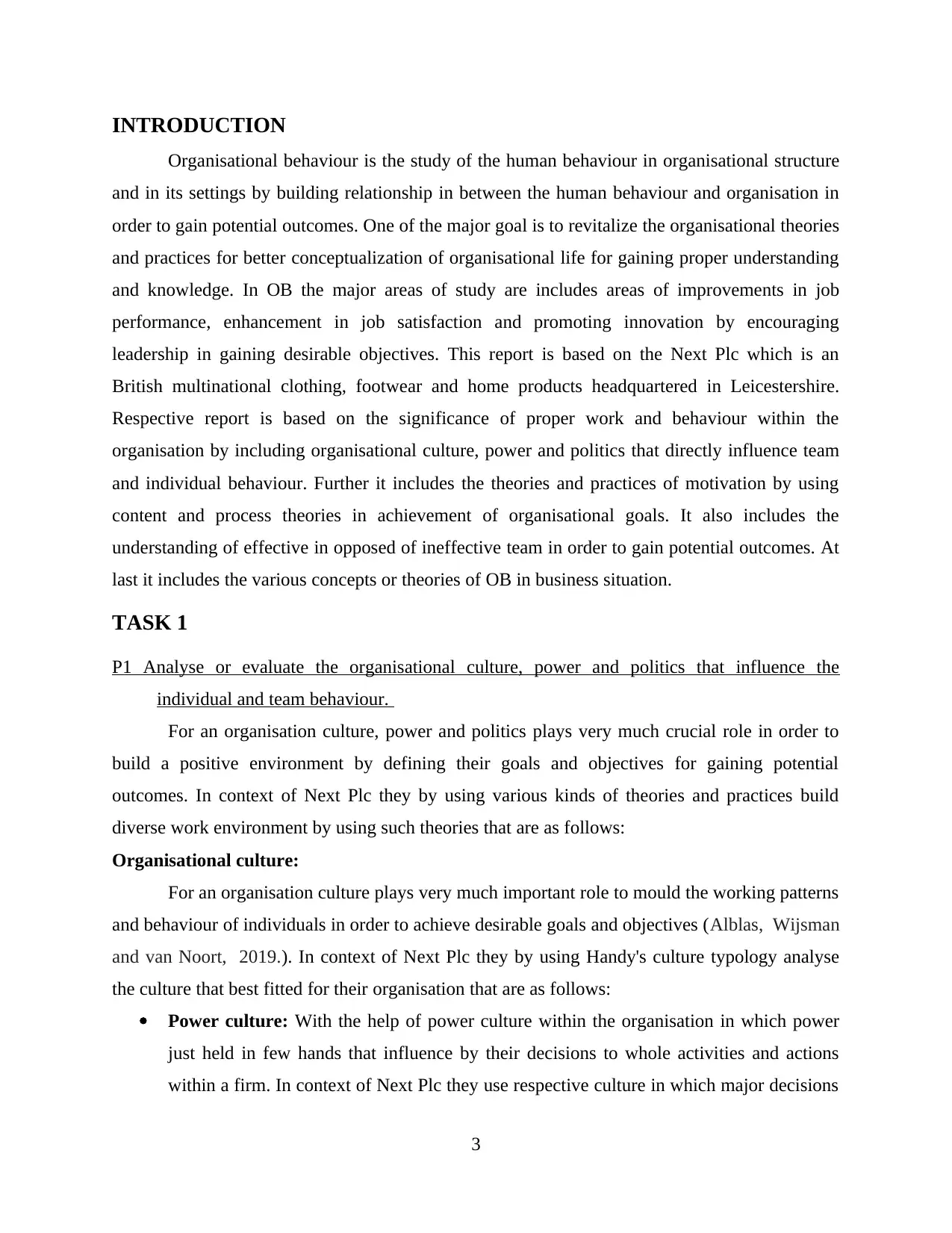
INTRODUCTION
Organisational behaviour is the study of the human behaviour in organisational structure
and in its settings by building relationship in between the human behaviour and organisation in
order to gain potential outcomes. One of the major goal is to revitalize the organisational theories
and practices for better conceptualization of organisational life for gaining proper understanding
and knowledge. In OB the major areas of study are includes areas of improvements in job
performance, enhancement in job satisfaction and promoting innovation by encouraging
leadership in gaining desirable objectives. This report is based on the Next Plc which is an
British multinational clothing, footwear and home products headquartered in Leicestershire.
Respective report is based on the significance of proper work and behaviour within the
organisation by including organisational culture, power and politics that directly influence team
and individual behaviour. Further it includes the theories and practices of motivation by using
content and process theories in achievement of organisational goals. It also includes the
understanding of effective in opposed of ineffective team in order to gain potential outcomes. At
last it includes the various concepts or theories of OB in business situation.
TASK 1
P1 Analyse or evaluate the organisational culture, power and politics that influence the
individual and team behaviour.
For an organisation culture, power and politics plays very much crucial role in order to
build a positive environment by defining their goals and objectives for gaining potential
outcomes. In context of Next Plc they by using various kinds of theories and practices build
diverse work environment by using such theories that are as follows:
Organisational culture:
For an organisation culture plays very much important role to mould the working patterns
and behaviour of individuals in order to achieve desirable goals and objectives (Alblas, Wijsman
and van Noort, 2019.). In context of Next Plc they by using Handy's culture typology analyse
the culture that best fitted for their organisation that are as follows:
Power culture: With the help of power culture within the organisation in which power
just held in few hands that influence by their decisions to whole activities and actions
within a firm. In context of Next Plc they use respective culture in which major decisions
3
Organisational behaviour is the study of the human behaviour in organisational structure
and in its settings by building relationship in between the human behaviour and organisation in
order to gain potential outcomes. One of the major goal is to revitalize the organisational theories
and practices for better conceptualization of organisational life for gaining proper understanding
and knowledge. In OB the major areas of study are includes areas of improvements in job
performance, enhancement in job satisfaction and promoting innovation by encouraging
leadership in gaining desirable objectives. This report is based on the Next Plc which is an
British multinational clothing, footwear and home products headquartered in Leicestershire.
Respective report is based on the significance of proper work and behaviour within the
organisation by including organisational culture, power and politics that directly influence team
and individual behaviour. Further it includes the theories and practices of motivation by using
content and process theories in achievement of organisational goals. It also includes the
understanding of effective in opposed of ineffective team in order to gain potential outcomes. At
last it includes the various concepts or theories of OB in business situation.
TASK 1
P1 Analyse or evaluate the organisational culture, power and politics that influence the
individual and team behaviour.
For an organisation culture, power and politics plays very much crucial role in order to
build a positive environment by defining their goals and objectives for gaining potential
outcomes. In context of Next Plc they by using various kinds of theories and practices build
diverse work environment by using such theories that are as follows:
Organisational culture:
For an organisation culture plays very much important role to mould the working patterns
and behaviour of individuals in order to achieve desirable goals and objectives (Alblas, Wijsman
and van Noort, 2019.). In context of Next Plc they by using Handy's culture typology analyse
the culture that best fitted for their organisation that are as follows:
Power culture: With the help of power culture within the organisation in which power
just held in few hands that influence by their decisions to whole activities and actions
within a firm. In context of Next Plc they use respective culture in which major decisions
3
⊘ This is a preview!⊘
Do you want full access?
Subscribe today to unlock all pages.

Trusted by 1+ million students worldwide
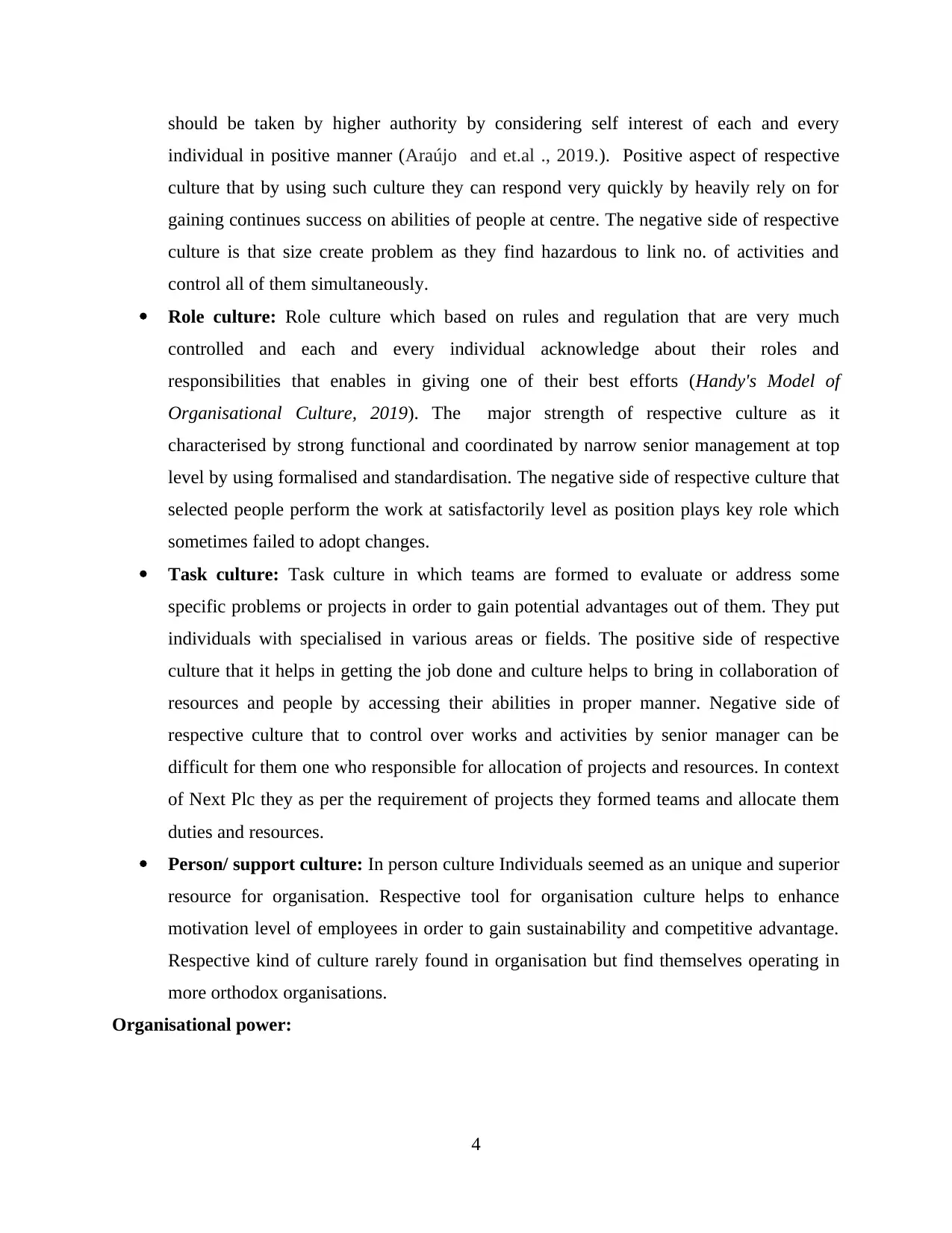
should be taken by higher authority by considering self interest of each and every
individual in positive manner (Araújo and et.al ., 2019.). Positive aspect of respective
culture that by using such culture they can respond very quickly by heavily rely on for
gaining continues success on abilities of people at centre. The negative side of respective
culture is that size create problem as they find hazardous to link no. of activities and
control all of them simultaneously.
Role culture: Role culture which based on rules and regulation that are very much
controlled and each and every individual acknowledge about their roles and
responsibilities that enables in giving one of their best efforts (Handy's Model of
Organisational Culture, 2019). The major strength of respective culture as it
characterised by strong functional and coordinated by narrow senior management at top
level by using formalised and standardisation. The negative side of respective culture that
selected people perform the work at satisfactorily level as position plays key role which
sometimes failed to adopt changes.
Task culture: Task culture in which teams are formed to evaluate or address some
specific problems or projects in order to gain potential advantages out of them. They put
individuals with specialised in various areas or fields. The positive side of respective
culture that it helps in getting the job done and culture helps to bring in collaboration of
resources and people by accessing their abilities in proper manner. Negative side of
respective culture that to control over works and activities by senior manager can be
difficult for them one who responsible for allocation of projects and resources. In context
of Next Plc they as per the requirement of projects they formed teams and allocate them
duties and resources.
Person/ support culture: In person culture Individuals seemed as an unique and superior
resource for organisation. Respective tool for organisation culture helps to enhance
motivation level of employees in order to gain sustainability and competitive advantage.
Respective kind of culture rarely found in organisation but find themselves operating in
more orthodox organisations.
Organisational power:
4
individual in positive manner (Araújo and et.al ., 2019.). Positive aspect of respective
culture that by using such culture they can respond very quickly by heavily rely on for
gaining continues success on abilities of people at centre. The negative side of respective
culture is that size create problem as they find hazardous to link no. of activities and
control all of them simultaneously.
Role culture: Role culture which based on rules and regulation that are very much
controlled and each and every individual acknowledge about their roles and
responsibilities that enables in giving one of their best efforts (Handy's Model of
Organisational Culture, 2019). The major strength of respective culture as it
characterised by strong functional and coordinated by narrow senior management at top
level by using formalised and standardisation. The negative side of respective culture that
selected people perform the work at satisfactorily level as position plays key role which
sometimes failed to adopt changes.
Task culture: Task culture in which teams are formed to evaluate or address some
specific problems or projects in order to gain potential advantages out of them. They put
individuals with specialised in various areas or fields. The positive side of respective
culture that it helps in getting the job done and culture helps to bring in collaboration of
resources and people by accessing their abilities in proper manner. Negative side of
respective culture that to control over works and activities by senior manager can be
difficult for them one who responsible for allocation of projects and resources. In context
of Next Plc they as per the requirement of projects they formed teams and allocate them
duties and resources.
Person/ support culture: In person culture Individuals seemed as an unique and superior
resource for organisation. Respective tool for organisation culture helps to enhance
motivation level of employees in order to gain sustainability and competitive advantage.
Respective kind of culture rarely found in organisation but find themselves operating in
more orthodox organisations.
Organisational power:
4
Paraphrase This Document
Need a fresh take? Get an instant paraphrase of this document with our AI Paraphraser
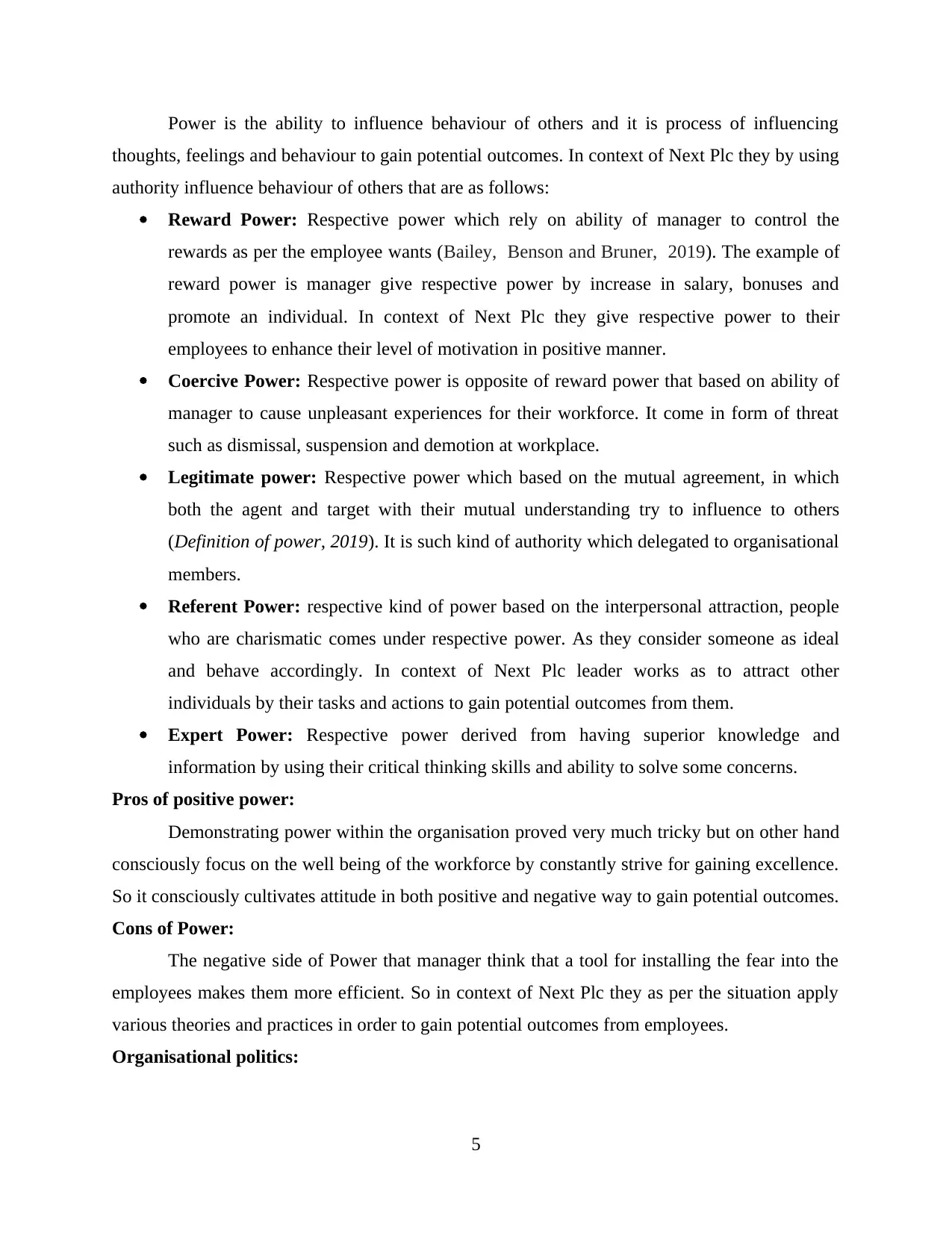
Power is the ability to influence behaviour of others and it is process of influencing
thoughts, feelings and behaviour to gain potential outcomes. In context of Next Plc they by using
authority influence behaviour of others that are as follows:
Reward Power: Respective power which rely on ability of manager to control the
rewards as per the employee wants (Bailey, Benson and Bruner, 2019). The example of
reward power is manager give respective power by increase in salary, bonuses and
promote an individual. In context of Next Plc they give respective power to their
employees to enhance their level of motivation in positive manner.
Coercive Power: Respective power is opposite of reward power that based on ability of
manager to cause unpleasant experiences for their workforce. It come in form of threat
such as dismissal, suspension and demotion at workplace.
Legitimate power: Respective power which based on the mutual agreement, in which
both the agent and target with their mutual understanding try to influence to others
(Definition of power, 2019). It is such kind of authority which delegated to organisational
members.
Referent Power: respective kind of power based on the interpersonal attraction, people
who are charismatic comes under respective power. As they consider someone as ideal
and behave accordingly. In context of Next Plc leader works as to attract other
individuals by their tasks and actions to gain potential outcomes from them.
Expert Power: Respective power derived from having superior knowledge and
information by using their critical thinking skills and ability to solve some concerns.
Pros of positive power:
Demonstrating power within the organisation proved very much tricky but on other hand
consciously focus on the well being of the workforce by constantly strive for gaining excellence.
So it consciously cultivates attitude in both positive and negative way to gain potential outcomes.
Cons of Power:
The negative side of Power that manager think that a tool for installing the fear into the
employees makes them more efficient. So in context of Next Plc they as per the situation apply
various theories and practices in order to gain potential outcomes from employees.
Organisational politics:
5
thoughts, feelings and behaviour to gain potential outcomes. In context of Next Plc they by using
authority influence behaviour of others that are as follows:
Reward Power: Respective power which rely on ability of manager to control the
rewards as per the employee wants (Bailey, Benson and Bruner, 2019). The example of
reward power is manager give respective power by increase in salary, bonuses and
promote an individual. In context of Next Plc they give respective power to their
employees to enhance their level of motivation in positive manner.
Coercive Power: Respective power is opposite of reward power that based on ability of
manager to cause unpleasant experiences for their workforce. It come in form of threat
such as dismissal, suspension and demotion at workplace.
Legitimate power: Respective power which based on the mutual agreement, in which
both the agent and target with their mutual understanding try to influence to others
(Definition of power, 2019). It is such kind of authority which delegated to organisational
members.
Referent Power: respective kind of power based on the interpersonal attraction, people
who are charismatic comes under respective power. As they consider someone as ideal
and behave accordingly. In context of Next Plc leader works as to attract other
individuals by their tasks and actions to gain potential outcomes from them.
Expert Power: Respective power derived from having superior knowledge and
information by using their critical thinking skills and ability to solve some concerns.
Pros of positive power:
Demonstrating power within the organisation proved very much tricky but on other hand
consciously focus on the well being of the workforce by constantly strive for gaining excellence.
So it consciously cultivates attitude in both positive and negative way to gain potential outcomes.
Cons of Power:
The negative side of Power that manager think that a tool for installing the fear into the
employees makes them more efficient. So in context of Next Plc they as per the situation apply
various theories and practices in order to gain potential outcomes from employees.
Organisational politics:
5
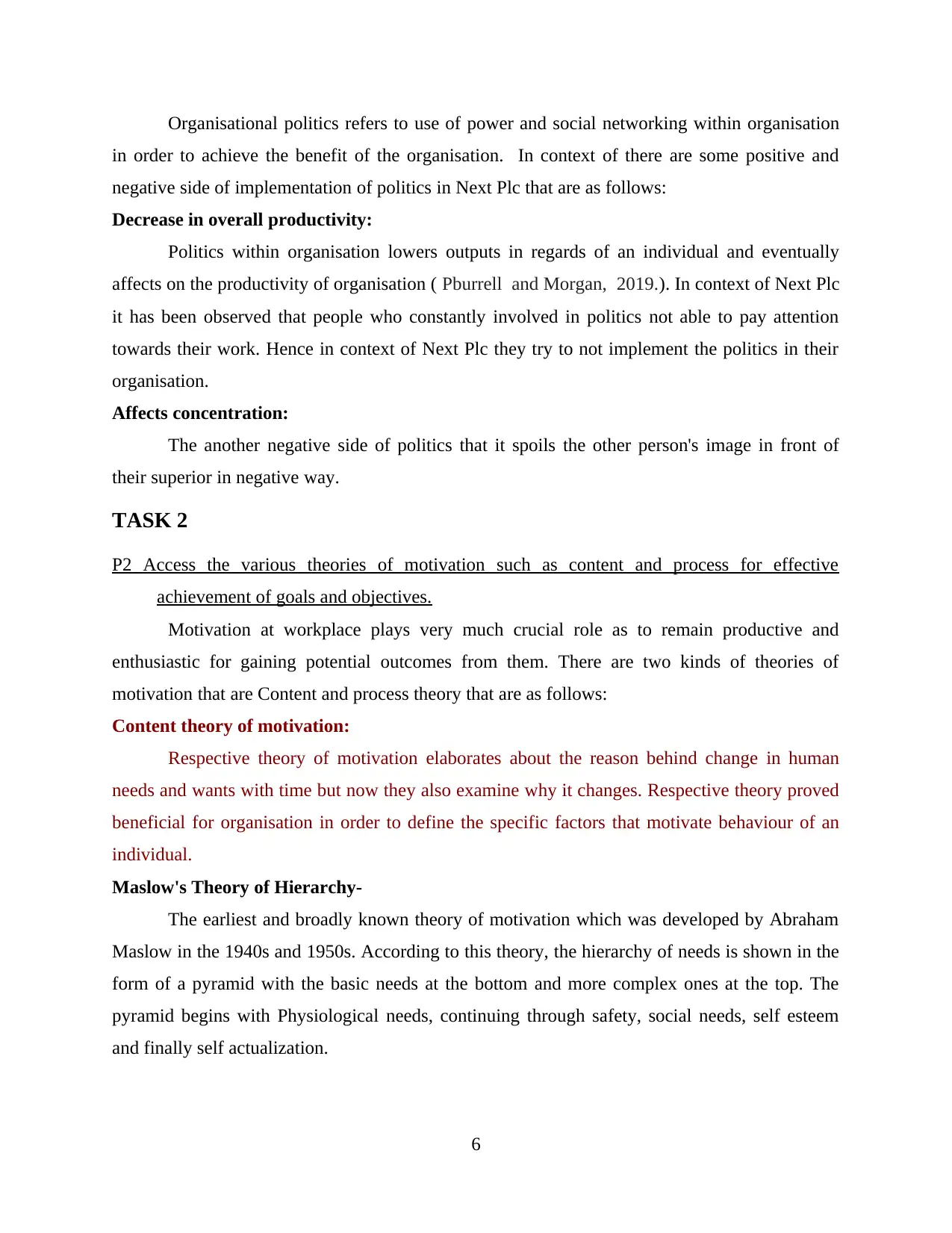
Organisational politics refers to use of power and social networking within organisation
in order to achieve the benefit of the organisation. In context of there are some positive and
negative side of implementation of politics in Next Plc that are as follows:
Decrease in overall productivity:
Politics within organisation lowers outputs in regards of an individual and eventually
affects on the productivity of organisation ( Pburrell and Morgan, 2019.). In context of Next Plc
it has been observed that people who constantly involved in politics not able to pay attention
towards their work. Hence in context of Next Plc they try to not implement the politics in their
organisation.
Affects concentration:
The another negative side of politics that it spoils the other person's image in front of
their superior in negative way.
TASK 2
P2 Access the various theories of motivation such as content and process for effective
achievement of goals and objectives.
Motivation at workplace plays very much crucial role as to remain productive and
enthusiastic for gaining potential outcomes from them. There are two kinds of theories of
motivation that are Content and process theory that are as follows:
Content theory of motivation:
Respective theory of motivation elaborates about the reason behind change in human
needs and wants with time but now they also examine why it changes. Respective theory proved
beneficial for organisation in order to define the specific factors that motivate behaviour of an
individual.
Maslow's Theory of Hierarchy-
The earliest and broadly known theory of motivation which was developed by Abraham
Maslow in the 1940s and 1950s. According to this theory, the hierarchy of needs is shown in the
form of a pyramid with the basic needs at the bottom and more complex ones at the top. The
pyramid begins with Physiological needs, continuing through safety, social needs, self esteem
and finally self actualization.
6
in order to achieve the benefit of the organisation. In context of there are some positive and
negative side of implementation of politics in Next Plc that are as follows:
Decrease in overall productivity:
Politics within organisation lowers outputs in regards of an individual and eventually
affects on the productivity of organisation ( Pburrell and Morgan, 2019.). In context of Next Plc
it has been observed that people who constantly involved in politics not able to pay attention
towards their work. Hence in context of Next Plc they try to not implement the politics in their
organisation.
Affects concentration:
The another negative side of politics that it spoils the other person's image in front of
their superior in negative way.
TASK 2
P2 Access the various theories of motivation such as content and process for effective
achievement of goals and objectives.
Motivation at workplace plays very much crucial role as to remain productive and
enthusiastic for gaining potential outcomes from them. There are two kinds of theories of
motivation that are Content and process theory that are as follows:
Content theory of motivation:
Respective theory of motivation elaborates about the reason behind change in human
needs and wants with time but now they also examine why it changes. Respective theory proved
beneficial for organisation in order to define the specific factors that motivate behaviour of an
individual.
Maslow's Theory of Hierarchy-
The earliest and broadly known theory of motivation which was developed by Abraham
Maslow in the 1940s and 1950s. According to this theory, the hierarchy of needs is shown in the
form of a pyramid with the basic needs at the bottom and more complex ones at the top. The
pyramid begins with Physiological needs, continuing through safety, social needs, self esteem
and finally self actualization.
6
⊘ This is a preview!⊘
Do you want full access?
Subscribe today to unlock all pages.

Trusted by 1+ million students worldwide
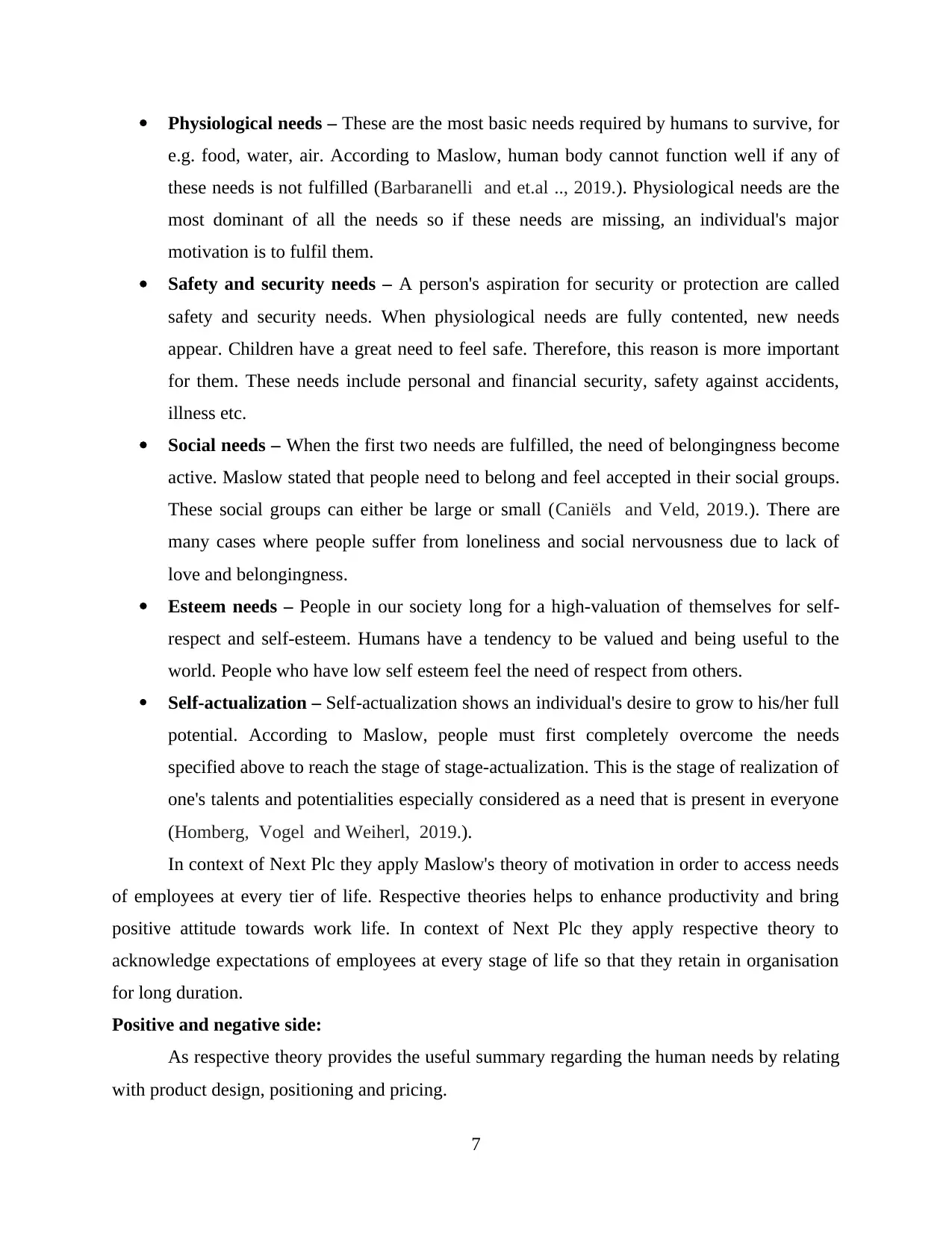
Physiological needs – These are the most basic needs required by humans to survive, for
e.g. food, water, air. According to Maslow, human body cannot function well if any of
these needs is not fulfilled (Barbaranelli and et.al .., 2019.). Physiological needs are the
most dominant of all the needs so if these needs are missing, an individual's major
motivation is to fulfil them.
Safety and security needs – A person's aspiration for security or protection are called
safety and security needs. When physiological needs are fully contented, new needs
appear. Children have a great need to feel safe. Therefore, this reason is more important
for them. These needs include personal and financial security, safety against accidents,
illness etc.
Social needs – When the first two needs are fulfilled, the need of belongingness become
active. Maslow stated that people need to belong and feel accepted in their social groups.
These social groups can either be large or small (Caniëls and Veld, 2019.). There are
many cases where people suffer from loneliness and social nervousness due to lack of
love and belongingness.
Esteem needs – People in our society long for a high-valuation of themselves for self-
respect and self-esteem. Humans have a tendency to be valued and being useful to the
world. People who have low self esteem feel the need of respect from others.
Self-actualization – Self-actualization shows an individual's desire to grow to his/her full
potential. According to Maslow, people must first completely overcome the needs
specified above to reach the stage of stage-actualization. This is the stage of realization of
one's talents and potentialities especially considered as a need that is present in everyone
(Homberg, Vogel and Weiherl, 2019.).
In context of Next Plc they apply Maslow's theory of motivation in order to access needs
of employees at every tier of life. Respective theories helps to enhance productivity and bring
positive attitude towards work life. In context of Next Plc they apply respective theory to
acknowledge expectations of employees at every stage of life so that they retain in organisation
for long duration.
Positive and negative side:
As respective theory provides the useful summary regarding the human needs by relating
with product design, positioning and pricing.
7
e.g. food, water, air. According to Maslow, human body cannot function well if any of
these needs is not fulfilled (Barbaranelli and et.al .., 2019.). Physiological needs are the
most dominant of all the needs so if these needs are missing, an individual's major
motivation is to fulfil them.
Safety and security needs – A person's aspiration for security or protection are called
safety and security needs. When physiological needs are fully contented, new needs
appear. Children have a great need to feel safe. Therefore, this reason is more important
for them. These needs include personal and financial security, safety against accidents,
illness etc.
Social needs – When the first two needs are fulfilled, the need of belongingness become
active. Maslow stated that people need to belong and feel accepted in their social groups.
These social groups can either be large or small (Caniëls and Veld, 2019.). There are
many cases where people suffer from loneliness and social nervousness due to lack of
love and belongingness.
Esteem needs – People in our society long for a high-valuation of themselves for self-
respect and self-esteem. Humans have a tendency to be valued and being useful to the
world. People who have low self esteem feel the need of respect from others.
Self-actualization – Self-actualization shows an individual's desire to grow to his/her full
potential. According to Maslow, people must first completely overcome the needs
specified above to reach the stage of stage-actualization. This is the stage of realization of
one's talents and potentialities especially considered as a need that is present in everyone
(Homberg, Vogel and Weiherl, 2019.).
In context of Next Plc they apply Maslow's theory of motivation in order to access needs
of employees at every tier of life. Respective theories helps to enhance productivity and bring
positive attitude towards work life. In context of Next Plc they apply respective theory to
acknowledge expectations of employees at every stage of life so that they retain in organisation
for long duration.
Positive and negative side:
As respective theory provides the useful summary regarding the human needs by relating
with product design, positioning and pricing.
7
Paraphrase This Document
Need a fresh take? Get an instant paraphrase of this document with our AI Paraphraser
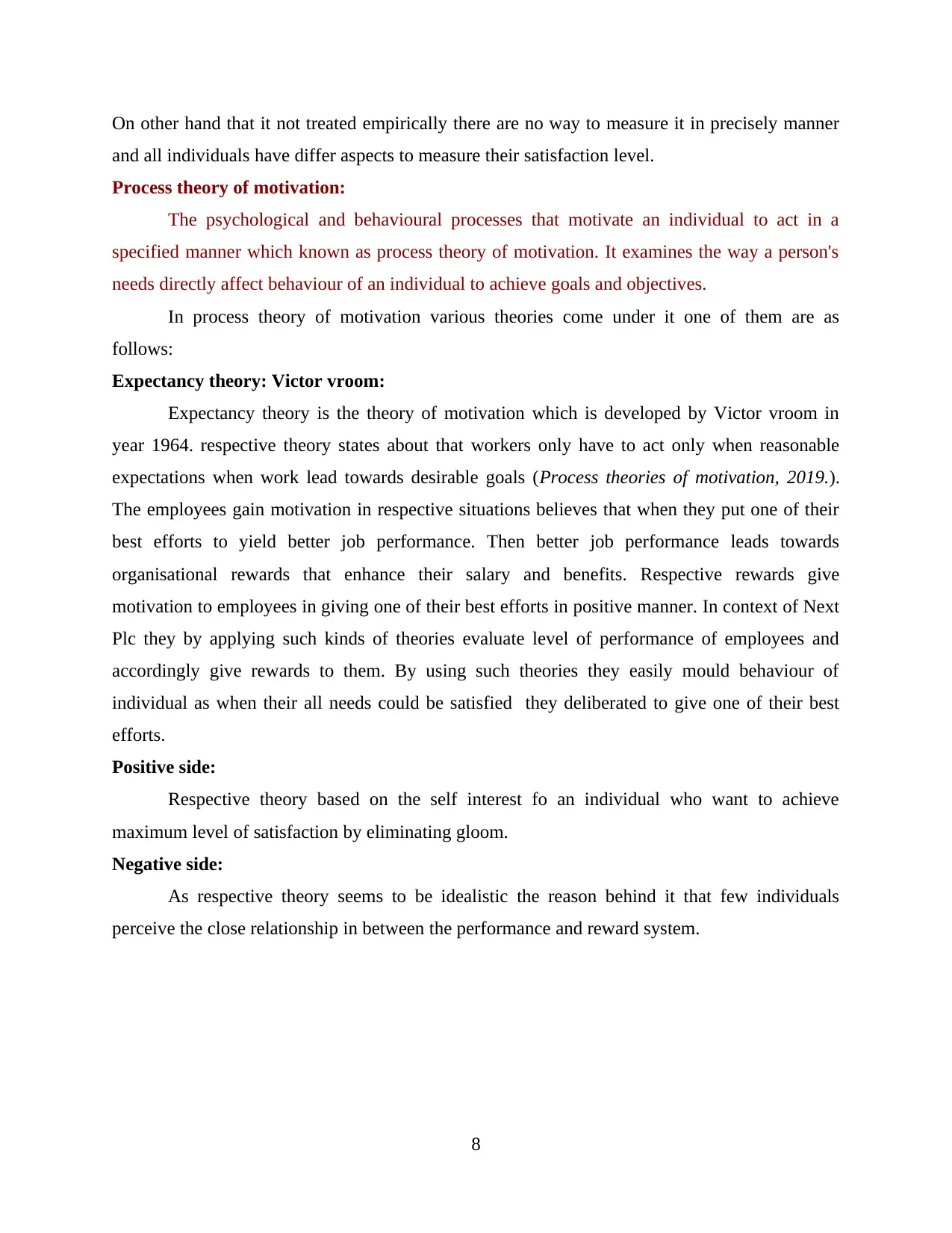
On other hand that it not treated empirically there are no way to measure it in precisely manner
and all individuals have differ aspects to measure their satisfaction level.
Process theory of motivation:
The psychological and behavioural processes that motivate an individual to act in a
specified manner which known as process theory of motivation. It examines the way a person's
needs directly affect behaviour of an individual to achieve goals and objectives.
In process theory of motivation various theories come under it one of them are as
follows:
Expectancy theory: Victor vroom:
Expectancy theory is the theory of motivation which is developed by Victor vroom in
year 1964. respective theory states about that workers only have to act only when reasonable
expectations when work lead towards desirable goals (Process theories of motivation, 2019.).
The employees gain motivation in respective situations believes that when they put one of their
best efforts to yield better job performance. Then better job performance leads towards
organisational rewards that enhance their salary and benefits. Respective rewards give
motivation to employees in giving one of their best efforts in positive manner. In context of Next
Plc they by applying such kinds of theories evaluate level of performance of employees and
accordingly give rewards to them. By using such theories they easily mould behaviour of
individual as when their all needs could be satisfied they deliberated to give one of their best
efforts.
Positive side:
Respective theory based on the self interest fo an individual who want to achieve
maximum level of satisfaction by eliminating gloom.
Negative side:
As respective theory seems to be idealistic the reason behind it that few individuals
perceive the close relationship in between the performance and reward system.
8
and all individuals have differ aspects to measure their satisfaction level.
Process theory of motivation:
The psychological and behavioural processes that motivate an individual to act in a
specified manner which known as process theory of motivation. It examines the way a person's
needs directly affect behaviour of an individual to achieve goals and objectives.
In process theory of motivation various theories come under it one of them are as
follows:
Expectancy theory: Victor vroom:
Expectancy theory is the theory of motivation which is developed by Victor vroom in
year 1964. respective theory states about that workers only have to act only when reasonable
expectations when work lead towards desirable goals (Process theories of motivation, 2019.).
The employees gain motivation in respective situations believes that when they put one of their
best efforts to yield better job performance. Then better job performance leads towards
organisational rewards that enhance their salary and benefits. Respective rewards give
motivation to employees in giving one of their best efforts in positive manner. In context of Next
Plc they by applying such kinds of theories evaluate level of performance of employees and
accordingly give rewards to them. By using such theories they easily mould behaviour of
individual as when their all needs could be satisfied they deliberated to give one of their best
efforts.
Positive side:
Respective theory based on the self interest fo an individual who want to achieve
maximum level of satisfaction by eliminating gloom.
Negative side:
As respective theory seems to be idealistic the reason behind it that few individuals
perceive the close relationship in between the performance and reward system.
8
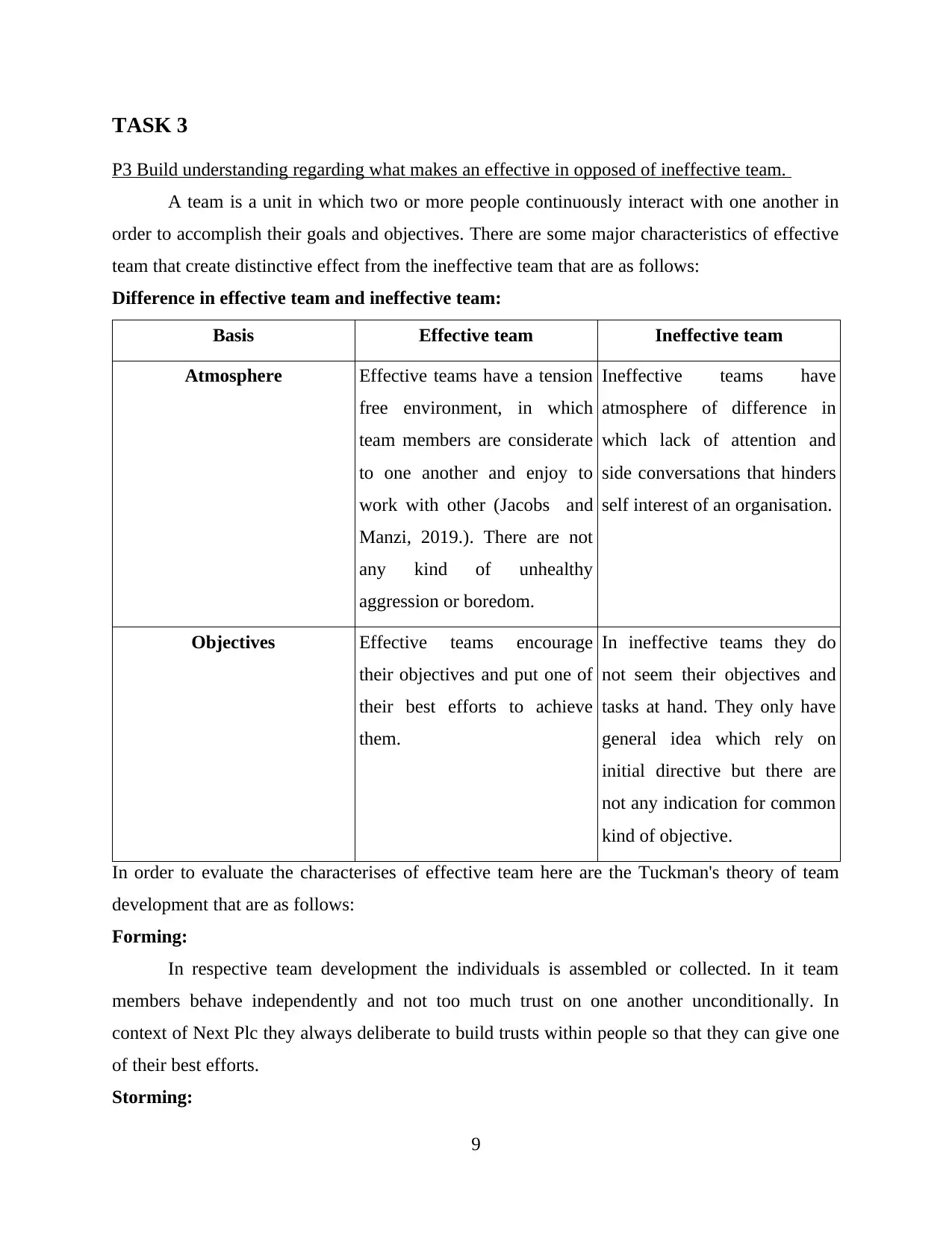
TASK 3
P3 Build understanding regarding what makes an effective in opposed of ineffective team.
A team is a unit in which two or more people continuously interact with one another in
order to accomplish their goals and objectives. There are some major characteristics of effective
team that create distinctive effect from the ineffective team that are as follows:
Difference in effective team and ineffective team:
Basis Effective team Ineffective team
Atmosphere Effective teams have a tension
free environment, in which
team members are considerate
to one another and enjoy to
work with other (Jacobs and
Manzi, 2019.). There are not
any kind of unhealthy
aggression or boredom.
Ineffective teams have
atmosphere of difference in
which lack of attention and
side conversations that hinders
self interest of an organisation.
Objectives Effective teams encourage
their objectives and put one of
their best efforts to achieve
them.
In ineffective teams they do
not seem their objectives and
tasks at hand. They only have
general idea which rely on
initial directive but there are
not any indication for common
kind of objective.
In order to evaluate the characterises of effective team here are the Tuckman's theory of team
development that are as follows:
Forming:
In respective team development the individuals is assembled or collected. In it team
members behave independently and not too much trust on one another unconditionally. In
context of Next Plc they always deliberate to build trusts within people so that they can give one
of their best efforts.
Storming:
9
P3 Build understanding regarding what makes an effective in opposed of ineffective team.
A team is a unit in which two or more people continuously interact with one another in
order to accomplish their goals and objectives. There are some major characteristics of effective
team that create distinctive effect from the ineffective team that are as follows:
Difference in effective team and ineffective team:
Basis Effective team Ineffective team
Atmosphere Effective teams have a tension
free environment, in which
team members are considerate
to one another and enjoy to
work with other (Jacobs and
Manzi, 2019.). There are not
any kind of unhealthy
aggression or boredom.
Ineffective teams have
atmosphere of difference in
which lack of attention and
side conversations that hinders
self interest of an organisation.
Objectives Effective teams encourage
their objectives and put one of
their best efforts to achieve
them.
In ineffective teams they do
not seem their objectives and
tasks at hand. They only have
general idea which rely on
initial directive but there are
not any indication for common
kind of objective.
In order to evaluate the characterises of effective team here are the Tuckman's theory of team
development that are as follows:
Forming:
In respective team development the individuals is assembled or collected. In it team
members behave independently and not too much trust on one another unconditionally. In
context of Next Plc they always deliberate to build trusts within people so that they can give one
of their best efforts.
Storming:
9
⊘ This is a preview!⊘
Do you want full access?
Subscribe today to unlock all pages.

Trusted by 1+ million students worldwide
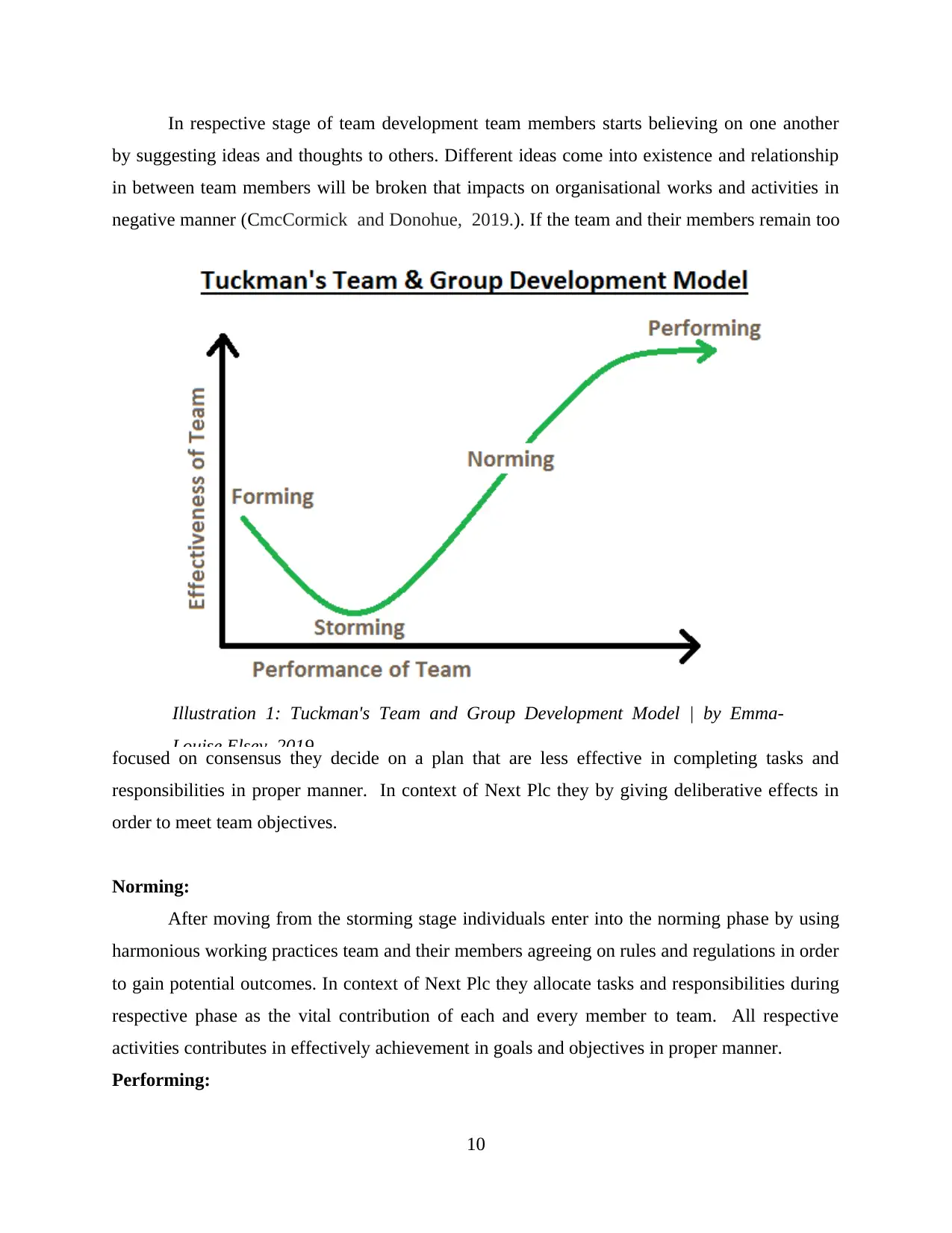
In respective stage of team development team members starts believing on one another
by suggesting ideas and thoughts to others. Different ideas come into existence and relationship
in between team members will be broken that impacts on organisational works and activities in
negative manner (CmcCormick and Donohue, 2019.). If the team and their members remain too
focused on consensus they decide on a plan that are less effective in completing tasks and
responsibilities in proper manner. In context of Next Plc they by giving deliberative effects in
order to meet team objectives.
Norming:
After moving from the storming stage individuals enter into the norming phase by using
harmonious working practices team and their members agreeing on rules and regulations in order
to gain potential outcomes. In context of Next Plc they allocate tasks and responsibilities during
respective phase as the vital contribution of each and every member to team. All respective
activities contributes in effectively achievement in goals and objectives in proper manner.
Performing:
10
Illustration 1: Tuckman's Team and Group Development Model | by Emma-
Louise Elsey, 2019
by suggesting ideas and thoughts to others. Different ideas come into existence and relationship
in between team members will be broken that impacts on organisational works and activities in
negative manner (CmcCormick and Donohue, 2019.). If the team and their members remain too
focused on consensus they decide on a plan that are less effective in completing tasks and
responsibilities in proper manner. In context of Next Plc they by giving deliberative effects in
order to meet team objectives.
Norming:
After moving from the storming stage individuals enter into the norming phase by using
harmonious working practices team and their members agreeing on rules and regulations in order
to gain potential outcomes. In context of Next Plc they allocate tasks and responsibilities during
respective phase as the vital contribution of each and every member to team. All respective
activities contributes in effectively achievement in goals and objectives in proper manner.
Performing:
10
Illustration 1: Tuckman's Team and Group Development Model | by Emma-
Louise Elsey, 2019
Paraphrase This Document
Need a fresh take? Get an instant paraphrase of this document with our AI Paraphraser
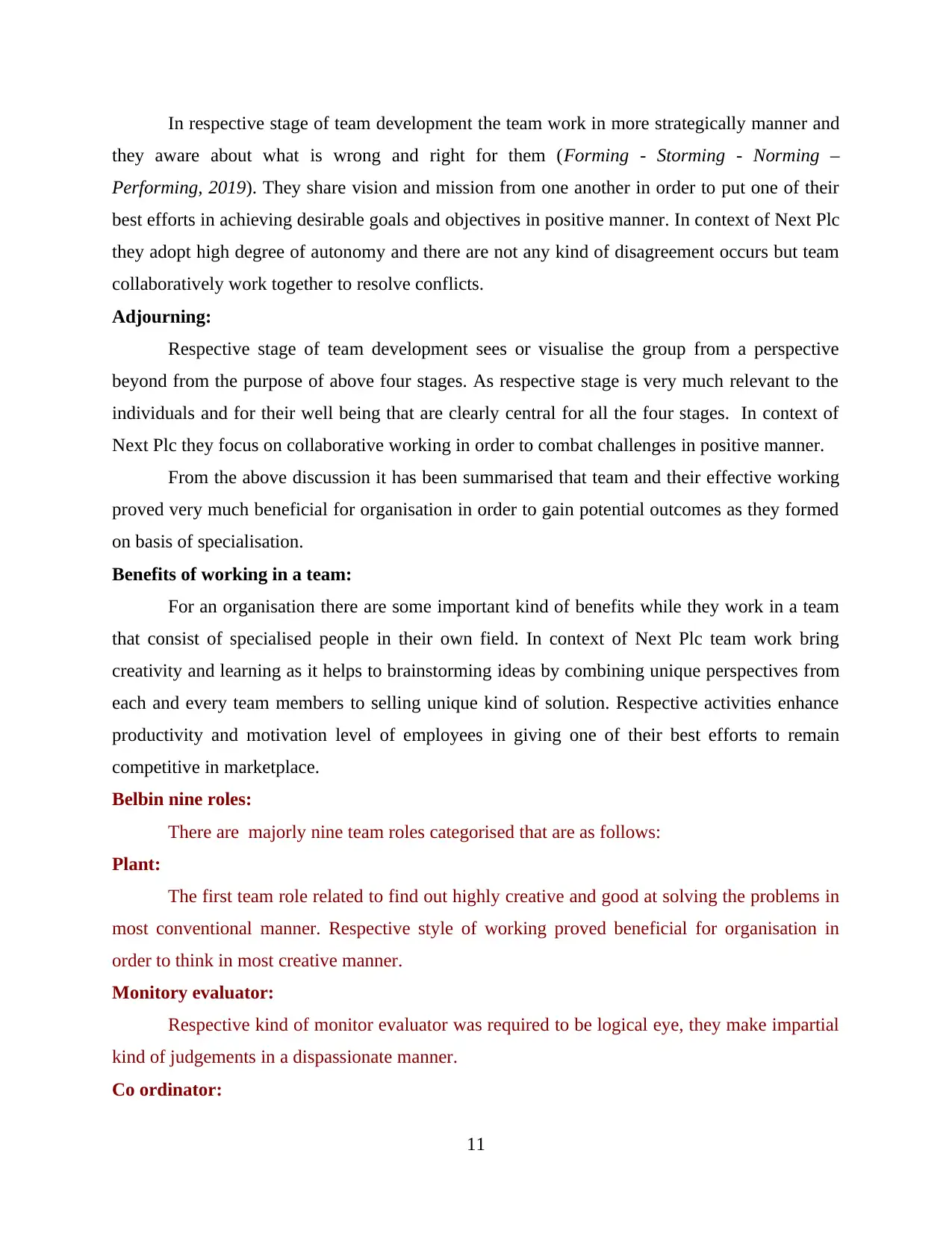
In respective stage of team development the team work in more strategically manner and
they aware about what is wrong and right for them (Forming - Storming - Norming –
Performing, 2019). They share vision and mission from one another in order to put one of their
best efforts in achieving desirable goals and objectives in positive manner. In context of Next Plc
they adopt high degree of autonomy and there are not any kind of disagreement occurs but team
collaboratively work together to resolve conflicts.
Adjourning:
Respective stage of team development sees or visualise the group from a perspective
beyond from the purpose of above four stages. As respective stage is very much relevant to the
individuals and for their well being that are clearly central for all the four stages. In context of
Next Plc they focus on collaborative working in order to combat challenges in positive manner.
From the above discussion it has been summarised that team and their effective working
proved very much beneficial for organisation in order to gain potential outcomes as they formed
on basis of specialisation.
Benefits of working in a team:
For an organisation there are some important kind of benefits while they work in a team
that consist of specialised people in their own field. In context of Next Plc team work bring
creativity and learning as it helps to brainstorming ideas by combining unique perspectives from
each and every team members to selling unique kind of solution. Respective activities enhance
productivity and motivation level of employees in giving one of their best efforts to remain
competitive in marketplace.
Belbin nine roles:
There are majorly nine team roles categorised that are as follows:
Plant:
The first team role related to find out highly creative and good at solving the problems in
most conventional manner. Respective style of working proved beneficial for organisation in
order to think in most creative manner.
Monitory evaluator:
Respective kind of monitor evaluator was required to be logical eye, they make impartial
kind of judgements in a dispassionate manner.
Co ordinator:
11
they aware about what is wrong and right for them (Forming - Storming - Norming –
Performing, 2019). They share vision and mission from one another in order to put one of their
best efforts in achieving desirable goals and objectives in positive manner. In context of Next Plc
they adopt high degree of autonomy and there are not any kind of disagreement occurs but team
collaboratively work together to resolve conflicts.
Adjourning:
Respective stage of team development sees or visualise the group from a perspective
beyond from the purpose of above four stages. As respective stage is very much relevant to the
individuals and for their well being that are clearly central for all the four stages. In context of
Next Plc they focus on collaborative working in order to combat challenges in positive manner.
From the above discussion it has been summarised that team and their effective working
proved very much beneficial for organisation in order to gain potential outcomes as they formed
on basis of specialisation.
Benefits of working in a team:
For an organisation there are some important kind of benefits while they work in a team
that consist of specialised people in their own field. In context of Next Plc team work bring
creativity and learning as it helps to brainstorming ideas by combining unique perspectives from
each and every team members to selling unique kind of solution. Respective activities enhance
productivity and motivation level of employees in giving one of their best efforts to remain
competitive in marketplace.
Belbin nine roles:
There are majorly nine team roles categorised that are as follows:
Plant:
The first team role related to find out highly creative and good at solving the problems in
most conventional manner. Respective style of working proved beneficial for organisation in
order to think in most creative manner.
Monitory evaluator:
Respective kind of monitor evaluator was required to be logical eye, they make impartial
kind of judgements in a dispassionate manner.
Co ordinator:
11
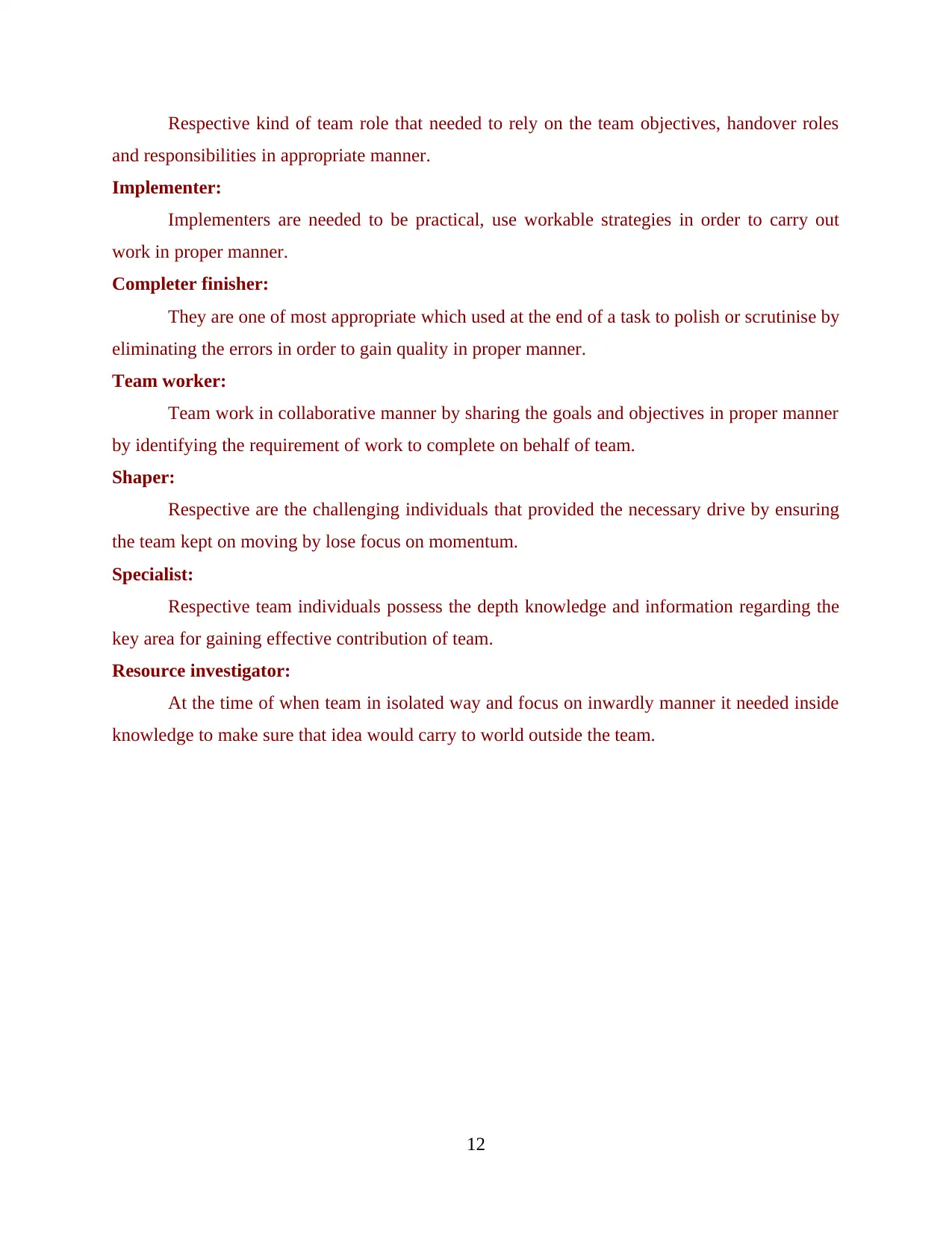
Respective kind of team role that needed to rely on the team objectives, handover roles
and responsibilities in appropriate manner.
Implementer:
Implementers are needed to be practical, use workable strategies in order to carry out
work in proper manner.
Completer finisher:
They are one of most appropriate which used at the end of a task to polish or scrutinise by
eliminating the errors in order to gain quality in proper manner.
Team worker:
Team work in collaborative manner by sharing the goals and objectives in proper manner
by identifying the requirement of work to complete on behalf of team.
Shaper:
Respective are the challenging individuals that provided the necessary drive by ensuring
the team kept on moving by lose focus on momentum.
Specialist:
Respective team individuals possess the depth knowledge and information regarding the
key area for gaining effective contribution of team.
Resource investigator:
At the time of when team in isolated way and focus on inwardly manner it needed inside
knowledge to make sure that idea would carry to world outside the team.
12
and responsibilities in appropriate manner.
Implementer:
Implementers are needed to be practical, use workable strategies in order to carry out
work in proper manner.
Completer finisher:
They are one of most appropriate which used at the end of a task to polish or scrutinise by
eliminating the errors in order to gain quality in proper manner.
Team worker:
Team work in collaborative manner by sharing the goals and objectives in proper manner
by identifying the requirement of work to complete on behalf of team.
Shaper:
Respective are the challenging individuals that provided the necessary drive by ensuring
the team kept on moving by lose focus on momentum.
Specialist:
Respective team individuals possess the depth knowledge and information regarding the
key area for gaining effective contribution of team.
Resource investigator:
At the time of when team in isolated way and focus on inwardly manner it needed inside
knowledge to make sure that idea would carry to world outside the team.
12
⊘ This is a preview!⊘
Do you want full access?
Subscribe today to unlock all pages.

Trusted by 1+ million students worldwide
1 out of 20
Related Documents
Your All-in-One AI-Powered Toolkit for Academic Success.
+13062052269
info@desklib.com
Available 24*7 on WhatsApp / Email
![[object Object]](/_next/static/media/star-bottom.7253800d.svg)
Unlock your academic potential
Copyright © 2020–2026 A2Z Services. All Rights Reserved. Developed and managed by ZUCOL.





